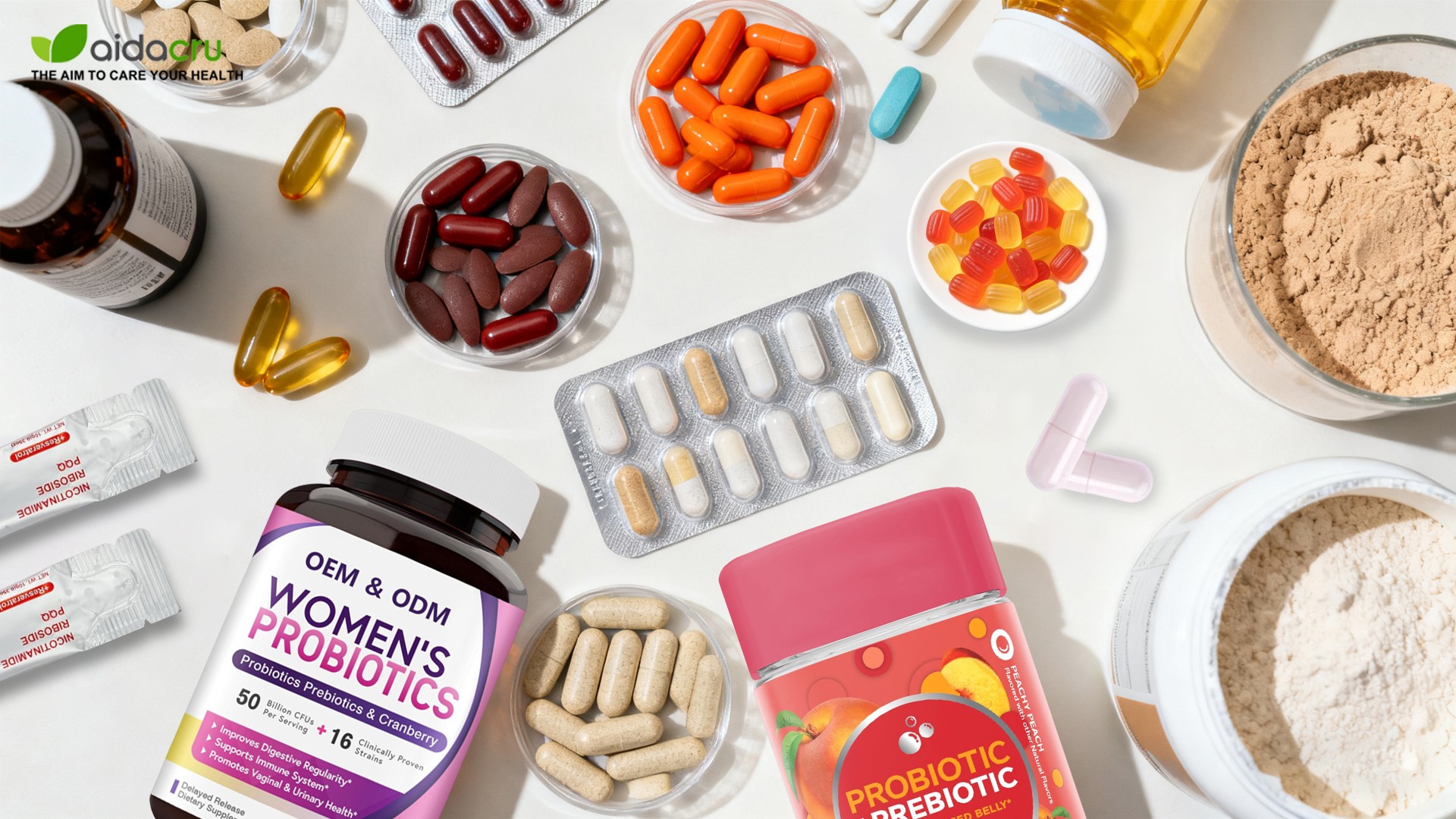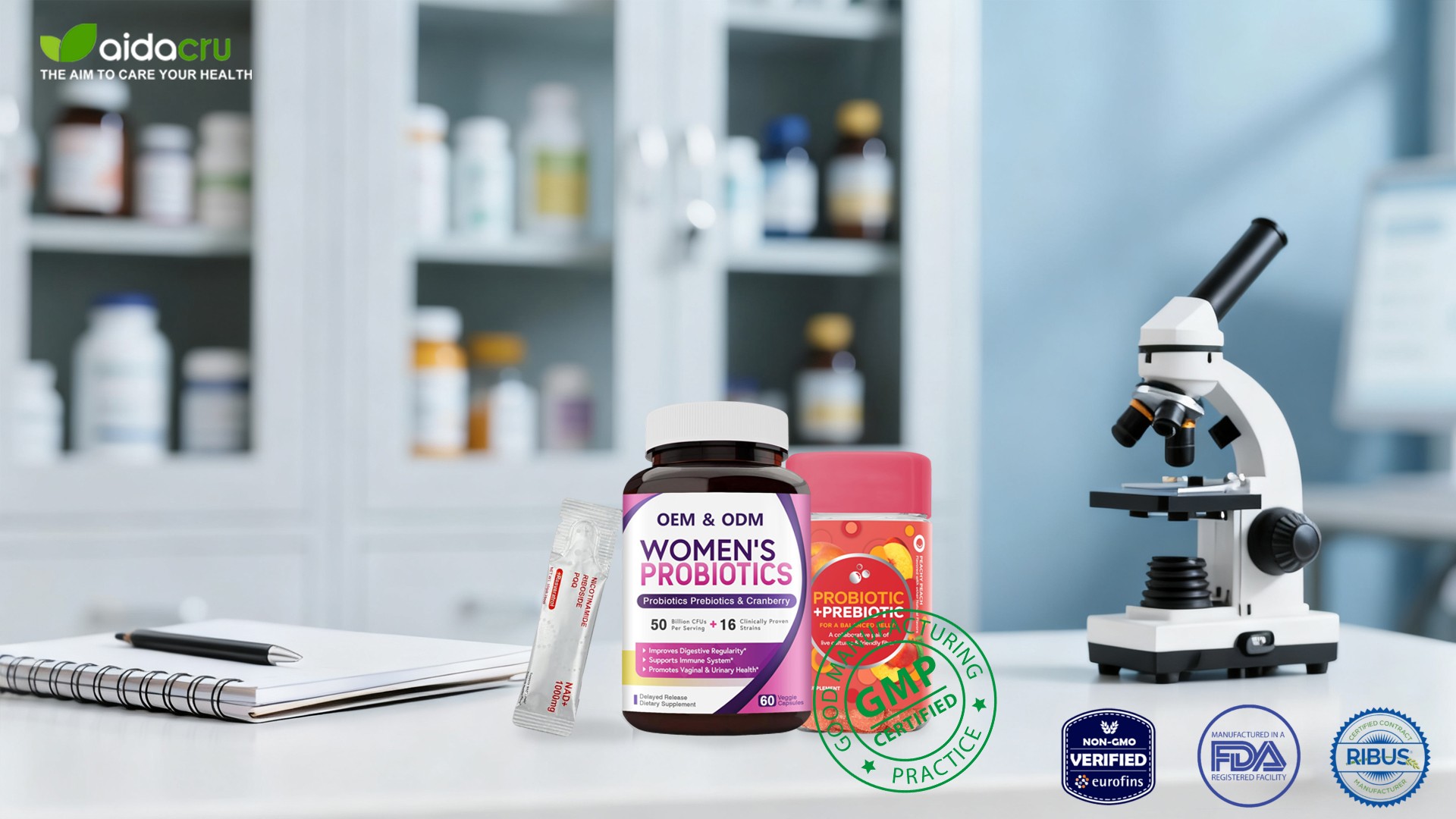In today’s health discussions, the concept of the gut microbiome is no longer unfamiliar. Research shows that the body’s microbial ecosystem profoundly influences immunity, digestion, mood, and even brain function. With faster-paced lifestyles and unbalanced diets, maintaining microbial balance has become a crucial trend in modern health management.

Within this system, probiotics play a crucial role. They are beneficial active bacteria that colonize the gut and help regulate bodily functions. When the diet does not provide enough of these beneficial microbes, probiotic supplements offer a scientific and convenient way to support gut health.
What Are Probiotic Supplements?
Probiotic supplements are nutritional products that provide beneficial active microbes to the body, helping to restore or enhance the balance of the gut microbiome. They play an important role when the intake of natural probiotics from the diet is insufficient, or when gut microbiota is disrupted due to stress, illness, or medication use.

Common forms of probiotic supplements include:
Capsules
Tablets
Powders
Lozenges
Liquid formulations
Compared to naturally fermented foods, probiotic supplements are more stable and allow for precise control of dosage and bacterial strains, enabling targeted selection based on different health needs.
Common Types and Structures of Probiotics
Probiotics are not a single type of microorganism; they encompass multiple genera and species. Taxonomically, they can be broadly categorized into the following five core genera:
Lactobacillus
Bifidobacterium
Saccharomyces
Streptococcus
Bacillus

Each genus contains multiple species, for example:
Lactobacillus acidophilus
Bifidobacterium longum
Lactobacillus rhamnosus
Each probiotic species can also be distinguished by a strain ID. For example, in Lactobacillus rhamnosus HN001, “HN001” represents a specific strain. Different strains, even within the same species, may vary in their functionality, stability, and ability to colonize the human gut.

Potential Health Benefits of Probiotic Supplements
Research on probiotic supplements continues to expand, and they are currently known to have positive effects in the following areas:
Gut-Brain Axis Support: Probiotics can influence communication between the gut and the brain, helping to regulate mood, reduce anxiety, and improve sleep quality.
Enhanced Immune Defense: Certain probiotics can strengthen the gut-associated lymphoid tissue (GALT), supporting defense against infections and inflammatory responses.
Improved Digestive Function: Commonly used to alleviate gastrointestinal discomforts such as diarrhea, constipation, bloating, and irritable bowel syndrome (IBS).
Women’s Intimate Health: Specific strains help maintain the microbial balance of the vagina and urinary tract, preventing recurrent urinary tract infections and vaginal infections.
Nutrient Absorption & Metabolic Regulation: Probiotics aid in the synthesis of B vitamins, inhibit the absorption of harmful substances, and assist in weight management.
It is important to note that probiotics are not a cure-all. Their mechanisms are complex, and their effects are influenced by factors such as strain type, dosage, and individual physiology. When supplementing, it is recommended to follow professional guidance and choose products that are supported by scientific research.

How to Choose High-Quality Probiotic Products?
When faced with the wide variety of products on the market, consumers should pay attention to the following points when choosing probiotic supplements:
Clear Strain Labeling
High-quality products should specify the genus + species + strain ID, such as Bifidobacterium lactis HN019, rather than just stating “Lactobacillus.”
Scientific Dosage
Products should indicate the CFU (colony-forming units) for each strain. A daily intake of at least 1 billion CFU is recommended, with effective doses in some clinical studies commonly ranging from 5 to 10 billion CFU.
Viability and Stability
Quality products often use microencapsulation or freeze-drying techniques to ensure that probiotics survive transit to the gut and remain effective.
Diverse Product Forms
Capsules, powders, drops, and children-specific probiotics should be selected based on the user group and usage scenario.
Third-Party Testing and Certification
Choosing brands with third-party viability testing, product traceability, and GMP certification greatly enhances safety and reliability.

Probiotics: Your “Micro Allies” for Daily Health Management
In today’s fast-paced, high-stress society, with unbalanced diets becoming the norm, the human gut microbiome faces significant challenges. Probiotic supplements, as a key component of microbiome-focused nutritional interventions, have gradually become an essential support for modern healthy living.
Whether you are focused on gut function, immune health, or daily nutritional support, the scientific use of probiotics can bring unexpectedly positive changes. And it all begins with your renewed understanding and trust in these “friendly bacteria.”






